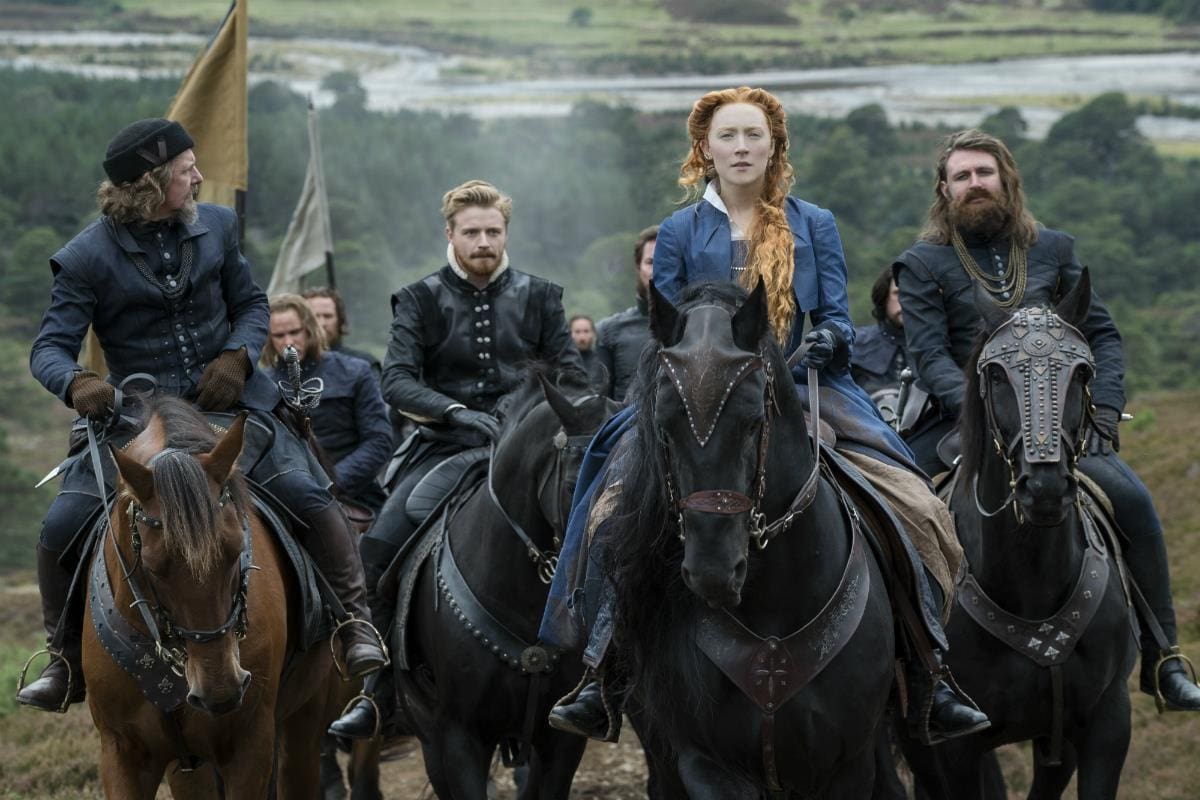
If you’re an Oscar enthusiasts, you’ve probably noticed that the times are changing. The films that are traditionally considered Oscar bait are now usually ignored or even actively dismissed and, as such, a majority of Mary Queen of Scots‘ Oscar buzz is focused on below the line nominations for Costume Design and Hair & Makeup. And that’s a shame — this isn’t necessarily high art, but it’s possibly the most fun you’ll have at a movie theater this holiday season. Director Josie Rourke crafts a hugely entertaining melodrama filled with monologues about the patriarchy, lavish costumes, impractical wigs, and plenty of cute boys playing terrible men. If Green Book can still score major nominations, then this film should too.
This costume drama focuses on the complicated relationship between the titular Mary (Saoirse Ronan) and her cousin, Elizabeth I, Queen of England (Margot Robbie). While the former wants to be named as the successor to the latter–something which England wants to avoid–the two women stress, above all else, that they will remain civil and rule their respective countries with respect for one another. But the men of their courts have ulterior motives, and actively work to chip away at their bond. The film traces how their relationship was warped, eventually leading to Mary’s imprisonment and execution at the order of Elizabeth. It’s a film that’s focused on exploring the way that man’s greed has permanently altered politics and history — but this is not a stiff period piece. Rourke keeps things fun and dramatic, like an expensive soap opera. And we’re all better off for it.
It’s not that Rourke is interested in downplaying the seriousness of the story at hand — this is, after all, a movie about the intense misogyny that pervades politics, with sexual violence, homophobia, and other social horrors taking up the screen time. But the film’s script comes from Beau Willimon, best known as the creator of Netflix’s House of Cards, as well as the writer of George Clooney’s silly misfire The Ides of March. His writing is incredibly self-important, where he examines the evils that go on behind the scenes in the political world as if he’s the first person to ever call-out such manipulative acts. Rourke, however, is not interested in shocking her viewers with the misdeeds of her subjects. She trusts her viewers to know that the world is oftentimes unkind to people other than straight, white men, and that politicians occasionally have less-than-pure motivations. She just wants them to enjoy the damn movie.
While your mileage on the film will vary depending on how much you like costume dramas, this period piece fanatic had a ball. With impeccable style and gloriously over-the-top wigs — one of which Margot Robbie literally snatches off her head after hearing something shocking — this film is a feast for the eyes. It’s also, frankly, a popcorn movie: the characters are almost always verbally sparring with one another, with every actor relishing over every line of dialogue. When they’re not talking about war, they’re either seducing each other, resisting their carnal urges in the most overwrought ways possible, or actually at war. It’s all fun, exciting, and over-the-top in the best way.
Of course, it does seem like Rourke is crafting the best film possible based on Willimon’s subpar screenplay. Again, he seems fascinated by the mere idea that a politician may be less than ideal, and that idea just is not as revelatory nor interesting as he seems to think it is. He also offers very little insight into what makes Mary and Elizabeth tick — they are fairly one-dimensional characters, who often announce their motivation to the audience. In a lesser director’s hands, this script could have been unbearable. But Rourke takes it in a new direction and makes it fun due to her understanding that this doesn’t have to be a stuffy, self-important character study. Any observations about gender roles in politics are provided by her direction, not his shortsighted writing.
But, yes, the times are changing — in 1998, the version of this film would have starred Anna Paquin and Nicole Kidman, and likely would have won Best Picture. It also would have most likely been directed by a man, and would have been maligned by film lovers on message boards for years to come. In 2018, Josie Rourke has crafted a version of this costume drama that is fun fresh, campy, and deliciously melodramatic. It may be ignored by the Academy, but it also serves as an example of how to do “Oscar bait” right.
Overall rating: 7 out of 10

